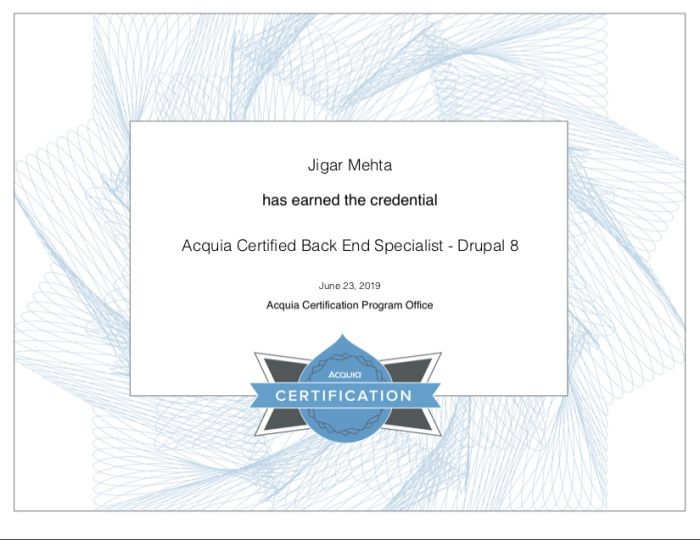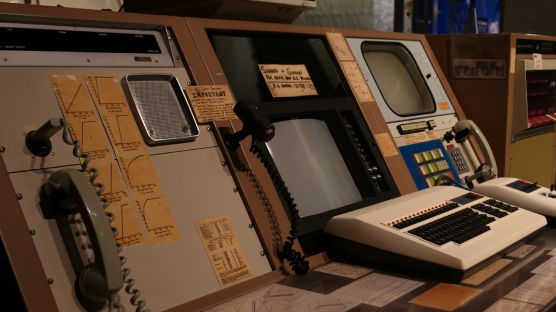In many lines of work, especially in IT, getting a certification can make a world of difference. Whether you have a job as a Drupal developer or you’re simply freelancing, having certain certificates can affect your career positively.

Acquia is a very popular name in the world of Drupal. Getting their Drupal certification might help you get an edge over your competitors – whether you’re applying for a job or trying to get your next project.
Two Minute Version
- Becoming an Acquia certified Drupal Developer or Triple Certified Drupal Expert can affect your career positively.
- The certification tests are substantially expensive.
- You need to do some preparation because certain questions cannot be answered from mere experience – Reading Drupal API docs is very helpful.
- Taking the online test is quite easy and economic – you save on transport and you can do the test comfortably from home.
- You get the results immediately after submitting the test. A certificate is emailed to you immediately in case you pass.
- Your name appears on the Acquia certification directory within 24 hours.
My Experience
I had been thinking about getting a Drupal 8 certification ever since I started working with Drupal 8 in mid 2016. Also, the company I work for, Evolving Web, have certain clients who value having certified Drupal developers on their projects. This gave me the extra push that I needed to get the Drupal 8 Expert certification. Besides, my employers bore half the certification expenses for which I am very thankful to them.

I had only 2 kinds of preps for the test – first, 3 years of Drupal 8 experience; second, reading Drupal API docs. Having done the test, I realized that reading the API docs is really helpful. I could’ve answered most of the questions from experience, but since the tests cost a lot, I didn’t want to take chances.
I registered for most of my tests less than an hour before taking them. Things went quite well, except for some tricky questions. I got the following scores in my Drupal 8 tests:
- Acquia Certified Drupal 8 Developer: 90%
- Acquia Certified Drupal 8 Back End Specialist: 93%
- Acquia Certified Drupal 8 Front End Specialist: 83%
I did 2 of the tests with a headache because I hadn’t slept well the night before and I finished my tests in around 45-75 minutes. In most cases, my name became visible in the Acquia certification directory within an hour and my name was added to the Triple Certified Drupal Experts directory in a day.
Apart from the unexpected tricky questions, I had one more problem. The formatting on my front end specialist certificate had an error. The certification date was overlapping the title and I had to contact the certification team. They tried their best to change it to match my other certs, but in the end, I decided to take matters in my own hand and fix it with Photoshop.
Test Structure
In short, expect to relive your school days! At least I did. Expect a variety of questions related to problems which you’d face while building a Drupal site – from site-building, to debugging PHP code, to mini-challenges in HTML/CSS/JS and most importantly, some tricky questions which will leave you scratching your head.
There is no live coding – all you need to do is choose 1-3 correct answers from a pool of 4-5 options. Yes, they’re all multiple-choice questions! If you’ve built 2-3 real Drupal sites, you should be able to pass with ease.
Online test
To do the test online, you need to register for it and install a piece of software called Sentinel. This software will prevent you from accessing any other apps during the exam. Besides, a supervisor will keep watch and hear you during the entire test, so you need to have a mic and a camera on your computer. This is why it is also called the online “proctored” test.
On the day of the test, go online 5-10 minutes in advance and you should be able to launch it from the online portal. Before you start, remember to be in a quiet room without any distractions – preferably alone. You cannot leave your seat, look around, use your phone or do any suspicious activities during the test. The test should last for around 45-75 minutes and you’ll receive the results as soon as you submit your answers.
On site test
I did the test online, so I don’t know much about this option. I would recommend doing it online because it is more comfortable – you will save time and money 💰
Certifications
There are 4 possible certifications you can aim for, depending on your requirements. They are listed below in the order of difficulty of their relevant tests.
- Acquia Certified Drupal Site-builder: Certifies that you can use Drupal’s admin interface to build a website and manage content without any coding skills.
- Acquia Certified Drupal Developer: Certifies that you can build sites and that you can deal with common Drupal back end and Drupal front end challenges.
- Acquia Certified Drupal Front End Specialist: Certifies that you can do Drupal development and that you can tackle most problems that a Drupal front end developer might face.
- Acquia Certified Drupal Back End Specialist: Certifies that you can do Drupal development and that you can tackle most problems that a Drupal back end developer might face.
Acquia Certified Drupal Expert
Though this one has a cool title, you won’t get any certificate for it. If you pass the Drupal Developer, Drupal Front End Specialist and the Drupal Back End Specialist exams, your name starts appearing on Acquia’s directory of Drupal Experts.
How to Prepare
Classes and Training
There are many independent Drupal training institutions and individuals that might help you prepare for the certification test. You can either invest in a training or if you’re a DIY person like me, you should try to get some hands-on experience and build at least one website with Drupal. But remember that there is no shame in taking classes/training – choose what suits you the most. The ultimate goal should be to become a better site-builder/developer – be it now or in a few years.
Programming Experience
Needless to say, Drupal is just a CMS built on PHP, so, make sure you know sufficient PHP and related tech like HTML/CSS/JS. You should also know certain programming concepts and best practices. Git is an integral part of any dev workflow and you should know commonly used git practices and commands to become a good developer. Drush and Drupal Console are also very commonly used tools in any Drupal development workflow.
Drupal Experience
For developers, back end or front end, I’d recommend building at least 3 websites with the version of Drupal for which you want to get certified. Try to solve all the problems that you face during these projects.
You can also try building a module that makes use of all the common APIs, for example, routing API, controller API, database API, entity API and theming-related APIs. Also, explore popular core and contrib modules to widen the horizons of your knowledge.
Contribution
You can contribute to the Drupal community in the form of patches, translations, reviews or even bug reports and feature suggestions. This should give you an idea about how the Drupal community works along with some practice. Contributing will also make your Drupal.org profile look cooler because it will start showing a list of issues on which you worked.
Read API Docs
The most valuable tip for devs: Read all Drupal API docs related to your field of expertise. You don’t need to know all the details but at least the things you would regularly run into. Know the commonly used admin menu items, hooks, base classes and concepts.
I don’t need to know everything, I just need to know where to find it when I need it.
However, during the Drupal certification test, like many other tests, you’re not allowed to refer to any resources – it’s just you and the things you know.
Sample Questions
From my experience, the questions ranged from a very low to medium range of difficulty. There were barely any difficult questions. Here are some noteworthy question types.
Regular Questions
These are easy to understand and easy to answer – they make you feel glad and comfortable. You can answer these with basic Drupal knowledge.
Sample
You made a change to your Drupal website but you get a WSOD after deployment. Thus, you cannot use the admin interface. What will be your next step?
- Use the SQL’s
DROPcommand to delete all cache tables. - Nothing can be done and the changes must be rolled back.
- Run the
drush rebuildcommand. - Nullify persistent cache using immediate change detection interface.
Advanced Questions
These questions require medium to advanced knowledge about certain Drupal features. If you’ve read about it or done it once, you should be able to answer them.
Sample
While trying to create a custom module, you created the following file.
# File: DRUPAL/modules/custom/bunny_wabbit/bunny_wabbit.info.yml
name: "Bunny Wabbit"
description: "Does the bunny hop as if it were year 2010."
core: "8.x"
version: "1.0-rc1"
However, Drupal cannot detect the module. What do you think is the problem?
- Module name cannot contain underscores
_. - The
typekey needs to be defined. - Custom modules should be placed in
DRUPAL/sites/all/modules/custom/. - It is not possible to create custom modules without Acquia certification.
Tricky Questions
It is substantially difficult to answer these questions. Even though you might know the topic, it can be hard to choose a specific answer! You have to use your wisdom and a little bit of luck for these questions 😉
I noticed two types of such tricky questions:
- Where no answer appears/is correct.
- Where more than one answer appears/is correct.
Sample
You have created a custom block in MODULE/nixi/src/Plugin/Block/NixiBlock.php. However, your block does not appear in the block management interface. What could be the problem?
- The plugin class name does not match the file name.
- The plugin class must extend
BlockBase. - The module
nixiis not installed. - Custom blocks must be declared in
hook_block_info().
Unbiased Review
Honestly, Acquia’s Drupal certification, like most other products/services, has it’s own pros and cons. However, in general, my experience was more on the positive side.
Positives
- A scale to measure your Drupal Knowledge.
- Test difficulty is easy to medium – definitely not hard, except for new Drupalers.
- Certification makes you look more professional – as an individual or as an organization with certified devs.
- Gives you an edge over the competition.
- Motivates you to learn Drupal and expand your Drupal knowledge.
- Adds your name to the Acquia certification registry.
Negatives
- Fixed price irrespective of your location makes it difficult for candidates from countries with weaker currencies.
- There is no special retest clause – you pay the full amount for a retest.
- Not much coding – a certified candidate might have Drupal knowledge that doesn’t imply that they write good code.
- Some tricky questions with multiple or no seemingly correct answers might demotivate you during the test.
- Overlap in test syllabi results in certain general topics in all tests.
Conclusion
- Acquia’s certification program can be beneficial to your career/business.
- Though the tests are not difficult, you need substantial knowledge to pass them.
- Reading Drupal API docs with hands-on experience should suffice for passing the test.
- The tests are quite expensive, so better not fail!
Next Steps
- Read about Acquia’s Drupal certification program.
- Read Drupal API documentation.
- Refer to Acquia’s certification directory to see who’s certified.
- Hire dedicated Drupal Developers on TopTal.







